Kevin Clarke
Operetta Research Center
11 March, 2019
“The Gay Hussars”? I admit, the title of the 1909 Broadway version of Emmerich Kalman’s first operetta hit Tatájárás caught my attention right away. It was recorded at the Ohio Light Opera and released on Albany Records in 2003, alas, rechristened Autumn Maneuvers. Which sounds decidedly less kinky, even though it’s the literal translation of Ein Herbstmanöver, which is the Viennese title that launched Kalman’s Austrian operetta career at Theater an der Wien. Now, from the opera house in Gießen comes a first German language live recording that can easily blow away the competition. It’s a bouncy new reading of Kalman’s score.
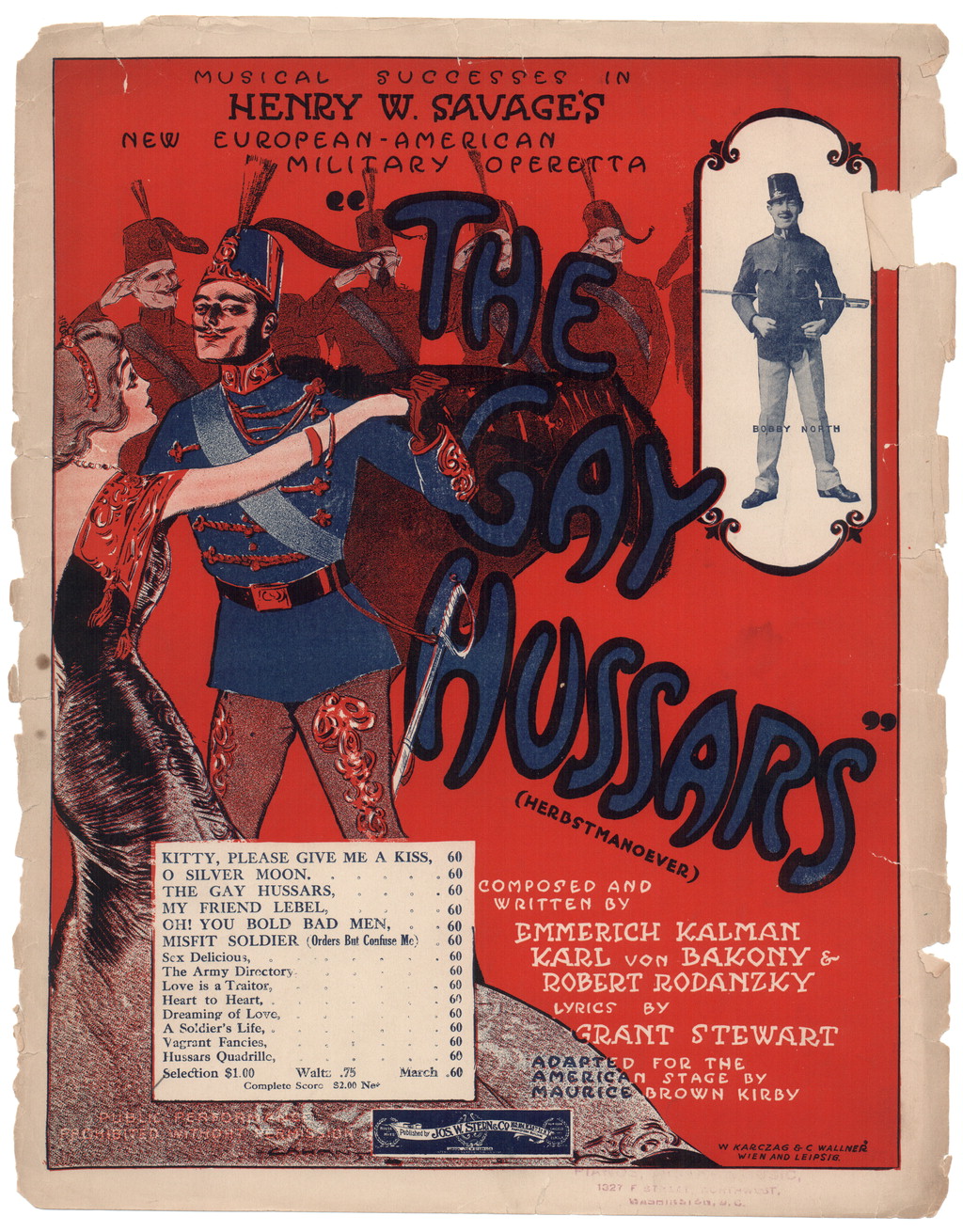
Selection from “The Gay Hussars,” Jos. W. Stern & Co., New York, 1909. (Photo: Library of Congress)
You know you’re on a different page altogether when the overture starts: the quality and drive of the Philharmonisches Orchester Gießen under conductor Michael Hofstetter is a far (far!) cry from Steven Byess at OLO. Here, Kalman’s musical battle portrait is played like Tchaikovsky’s 1812 overture (minus the canons) or Beethoven’s Leonore. There is real zest and explosiveness. And the trumpet behind the stage gives the soaring violins of the big “moon beams” waltz a counterpoint that is striking.
It’s obvious that Kalman had studied his classics well, and that he had just written two symphonic poems for large orchestra. This is not your usual operetta overture.
Tatájárás is actually not a ‘typical’ operetta anyway, more a play with music. At least in the original. Much of the fun is in the dialogue, and the scenes that allow the comedians to dazzle. In Vienna it was superstar Max Pallenberg as the I-want-to-get-out-of-the-army soldier Wallerstein. A grand name for a grand stage personality. By his side: another superstar, Louise Kartousch as the youthful Marosi, singing of kissing the ladies and seducing them with a uniform.
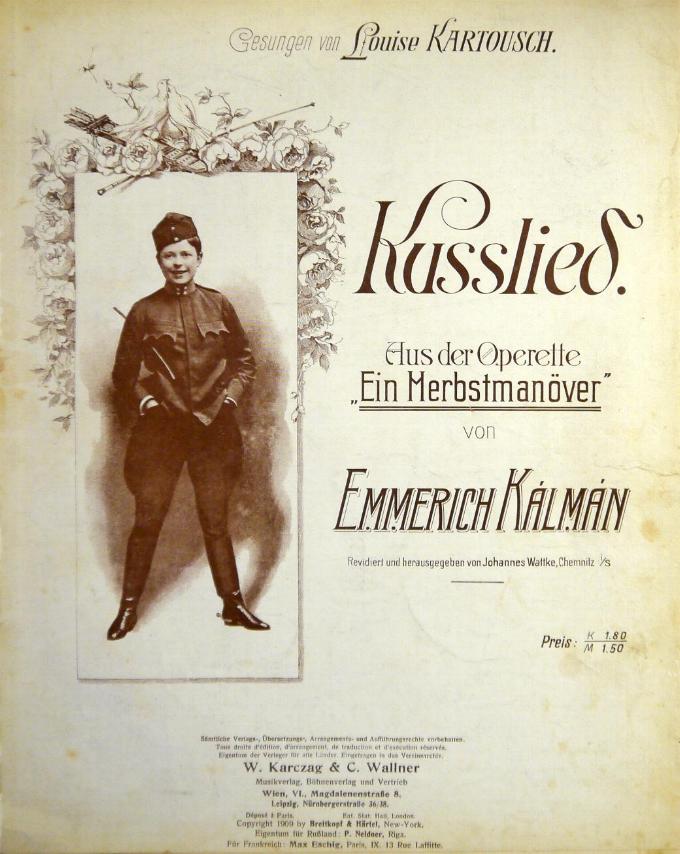
Sheet music cover for Kalman’s “Kusslied” from “Ein Herbstmanöver,” originally sung by Louise Kartousch.
The original version – as played in Budapest, Vienna and on Broadway – was quite a rowdy affair. A group of hussars is stationed in the castle of Baroness Riza, and all the ladies from the neighborhood come by because they all want to see the strapping young lads and dance with them at the ball. The only one not too happy with the arrangement is lieutenant Lörenthy. Because (a) Riza is his childhood sweetheart who married someone else: a rich old man who died shortly afterwards; and (b) the castle is actually Lörenthy’s former home which he had to sell to Riza’s husband because of his own father’s debt. Now he’s back to see his ex-bride and ex-castle … He prefers to stay outside and sleep in the park. He’s certainly not in the mood for parties. Or an encounter with Riza.
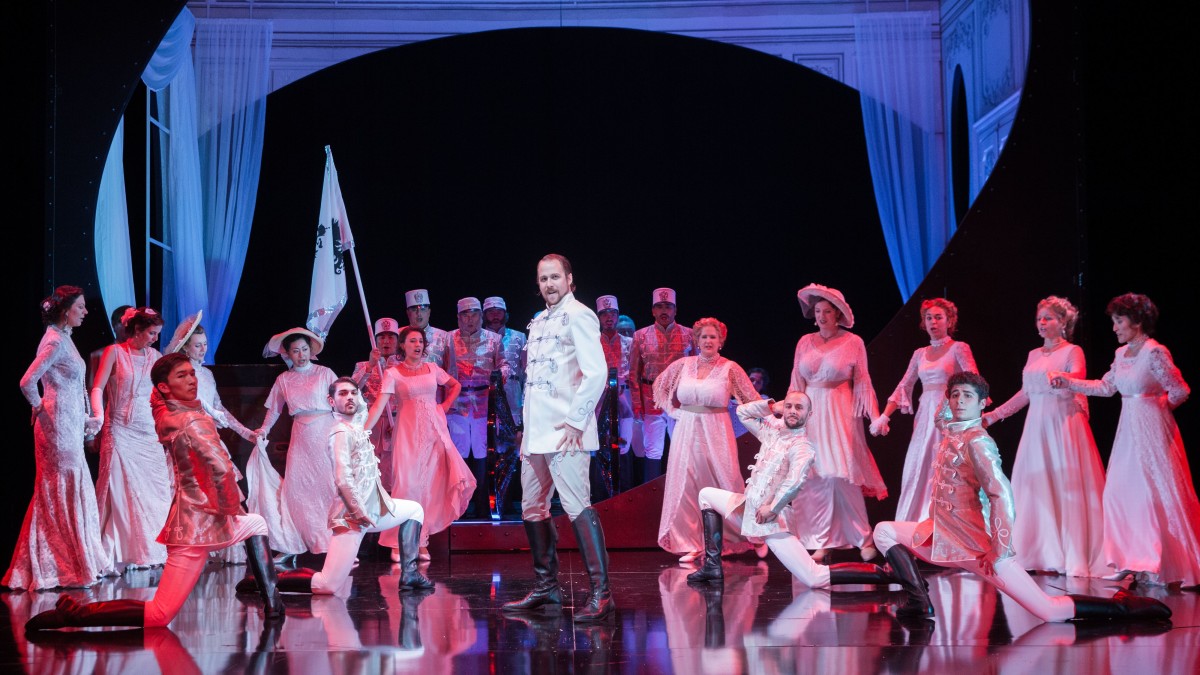
The hero of “Ein Herbstmanöver,” Oberleutnant von Lörenthy (Grga Peroš). (Photo: Rolf K. Wegst)
While the horny hussars are busy with the equally horny ladies, we follow the story of Riza explaining to Lörenthy that things were quite different to what he thinks, and that she hated her (now conveniently dead) husband (who left her a fortune). She never stopped loving Lörenthy. And after three acts and much maneuvering, Riza and Lörenthy come back together.
In the Gießen production the whole Herbstmanöner was not seen as a boisterous military romp, but as a melancholy farewell to the pre-WW1 world, that was to collapse shortly afterwards, with all its social hierarchies and conventions. Stage director Balázs Kovalik re-wrote much of the dialogue accordingly – as a fin de siècle fantasy of sentimentality and dreaminess.
[To read John Groves’ review of the stage production, click here.]
Dramaturg Matthias Kauffmann points out in his booklet text how this Herbstmanöver is a swansong to the “colorful world of the hussars,” how it’s all about “introspection,” about being related to the “tragic impotence” of Chekhov and the “pessimism” of Strindberg.
Well, that’s one way of looking at the show. In practice this means that conductor Michael Hofstetter revels in luxurious nostalgia more than he gets the riotous hussar marches and Hungarian flavored ensemble numbers off the ground. If you know how Kalman himself conducted his czardas compositions (in the 1940 New York concert) you’ll find Hofstetter a bit on the tame side. Which might come as a surprise after the wham-bang overture.
But interpreting Kalman’s Herbstmanöver from a perspective of melancholia is a legitimate approach. And the full orchestra plays very well, captured equally well by the microphones of Hessischer Rundfunk and Deutschlandradio Kultur.
When the performance was broadcast on the radio, the dialogue was included. Here, with the performance of 3 hours 10 minutes reduced to a single CD, the dialogue is cut or rather limited to cues. Also, the original 1909 order of numbers is shifted around drastically, to fit the stage director’s Chekhov/Strindberg approach.
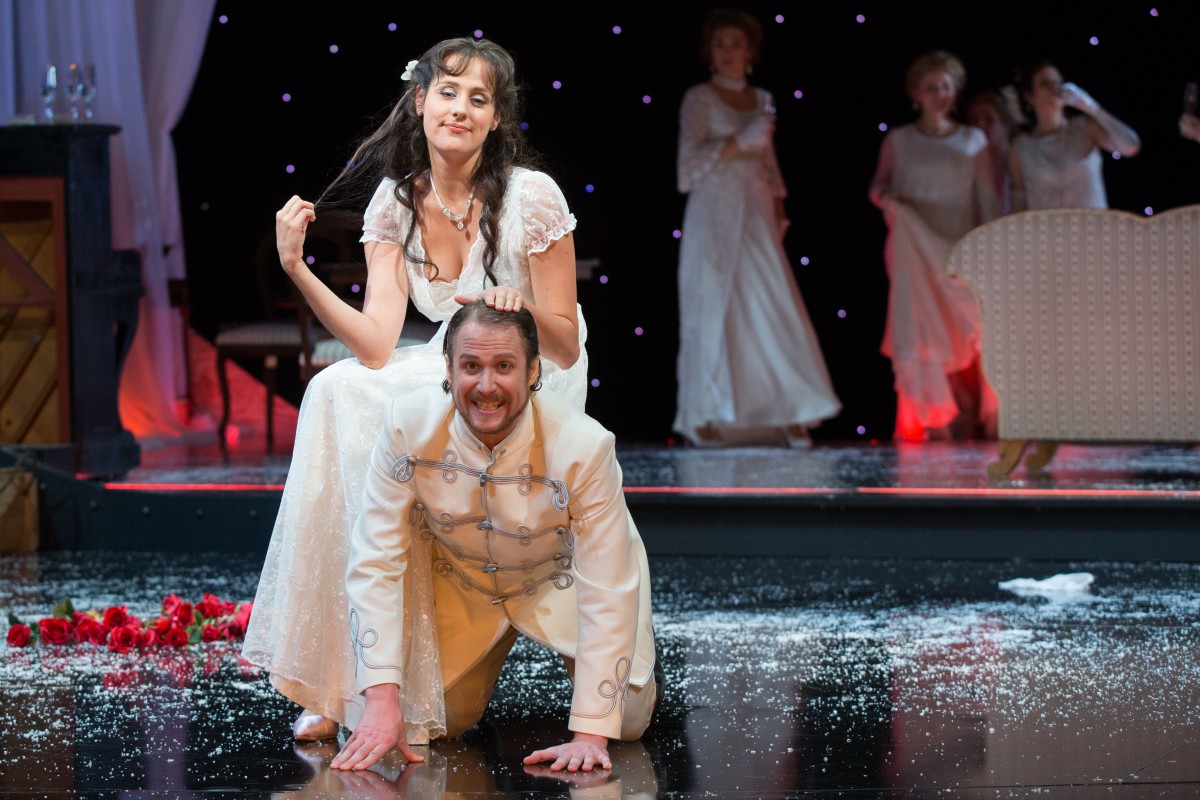
The comedians in “Ein Herbstmanöver” in Gießen. (Photo: Rolf K. Wegst)
Since there is not that much music in the original Viennese version (and even less in the original Hungarian one), the Gießen team has inserted four numbers from Kalman’s 1911 operetta Der Gute Kamerad. This brings the total number of tracks up to 21.
The re-shuffling of the score makes it a bit difficult to follow the action and to figure out who’s doing what with whom.
There are some remarkable performances, though. First of all, I enjoyed Christiane Boesinger as Riza greatly. She has a noticeably mature soprano that sounds lovely and floating in the higher regions but a bit like Maria Reining as the Marschallin in the lower regions. However, Boesinger actually allows herself many ‘dirty’ notes, she slides and glides through numbers and she pays nuanced attention to the text. With a conductor such as Adam Benzwi this performance would have probably turned into an operetta mile stone, with Michael Hofstetter it’s a noteworthy attempt to deliver “Viennese Operetta” differently, without going all the way.
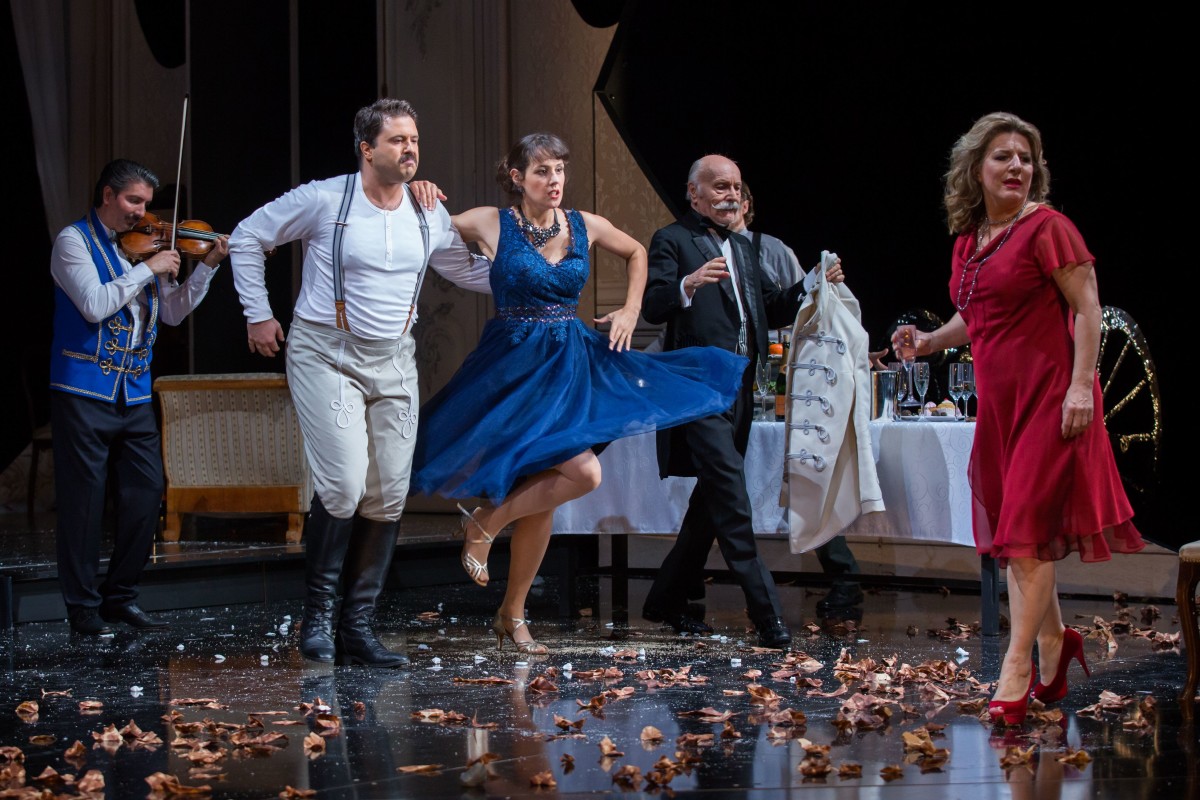
The big party scene in “Ein Herbstmanöver” at Gießen opera, with Grga Peroš as Lörenthy (left) and Christiane Boesinger as Riza (right). (Photo: Rolf K. Wegst)
Her Lörenthy is baritone Grga Peroš, singing his g-minor moon waltz (“Seh’ ich dich strahlen, erdulde ich Qualen” – “When I see you shine above I suffer….”) with some luscious pianissimi and an otherworldly falsetto at the end. Both Peroš and Boesinger sound decades older than Wade Woodward and Jacqueline Lengfelder on the Albany recording; but Woodward can bore you out of your mind, especially in the dialogue scenes. Peroš/Boesinger fit the Chekhov/Strindberg approach well, they portray characters with a history, not spring chicken.
The role of Marosi is taken by a man in Gießen: tenor Clemens Kerschbaumer. Having another male voice in the cast makes it somewhat difficult to differentiate between Marosi and the others, it’s slightly puzzling why Hofstetter and his team did not stick with Kalman’s original casting concept. (I’m sure there are strapping mezzos around in Gießen.)
Another change affects the comic role of Wallerstein (Tomi Wendt): the Gießen team thought that his never ending string of jokes can be considered anti-Semitic by modern theater goers. (It might be added that Pallenberg as well as the entire creative crew – Kalman, Robert Bodanzky, Wilhelm Karczag – were all Jewish, so the supposed anti-Semitism is more a form of self-irony. But how do you get that across in post-Holocaust Germany?)
To mark Wallerstein as an outsider, he is turned into a gay man. (“Gay Hussars” at last!) What exactly he’s up to in that scene which you see on the cover, and whether there’s a happy ending for him: the booklet doesn’t tell. And whether it’s an attempt at anal intercourse on stage – as seen on page 1 inside the booklet – has to remain a Gießen operetta secret, at least until there is a DVD release. (Why isn’t there one, actually?)
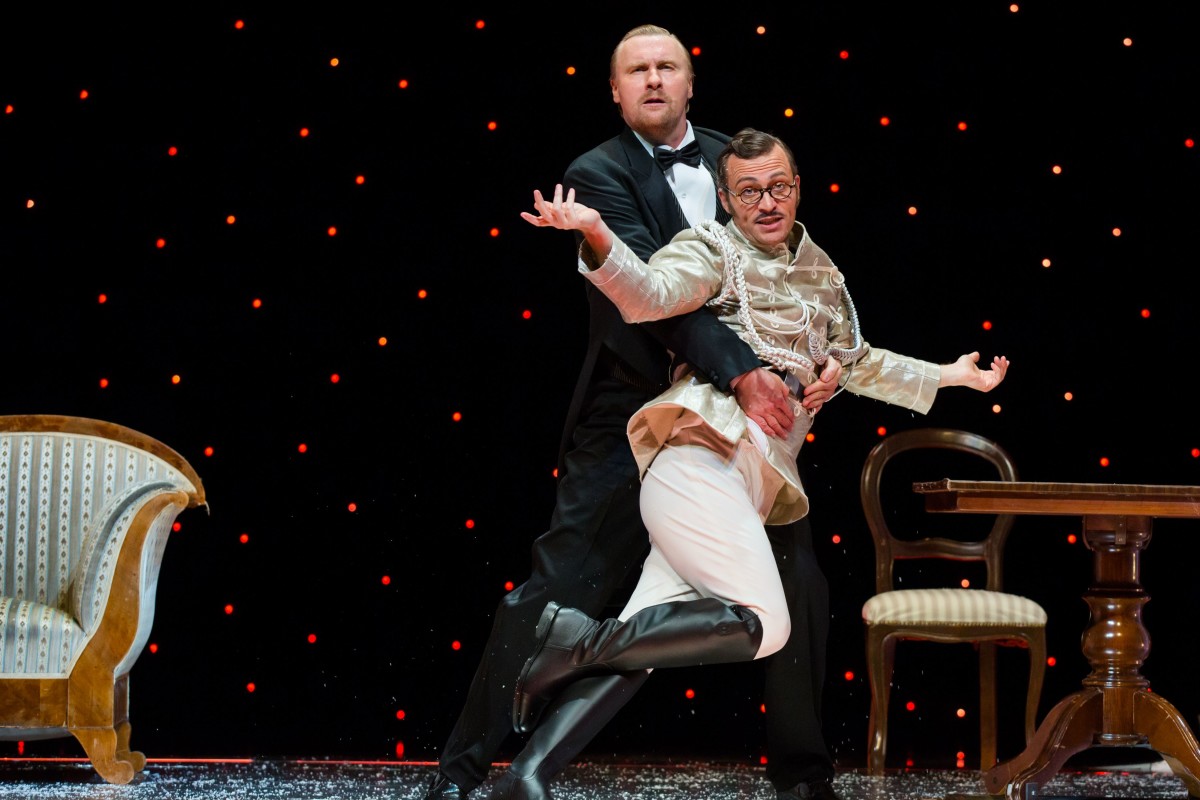
Wallerstein and Marosi find love in unexpected moments in “Ein Herbstmanöver.” (Photo: Rolf K. Wegst)
So, all in all, this is a recommendable new recording of Kalman’s first hit with which he made an international name for himself. I’d love to hear the original Broadway version adapted by Maurice Brown as a “New European-American Military Operetta,” with lyrics by Grant Steward. (On the Ohio version you hear “A Romantic Comic Opera” in a new English version by Steven Daigle.)
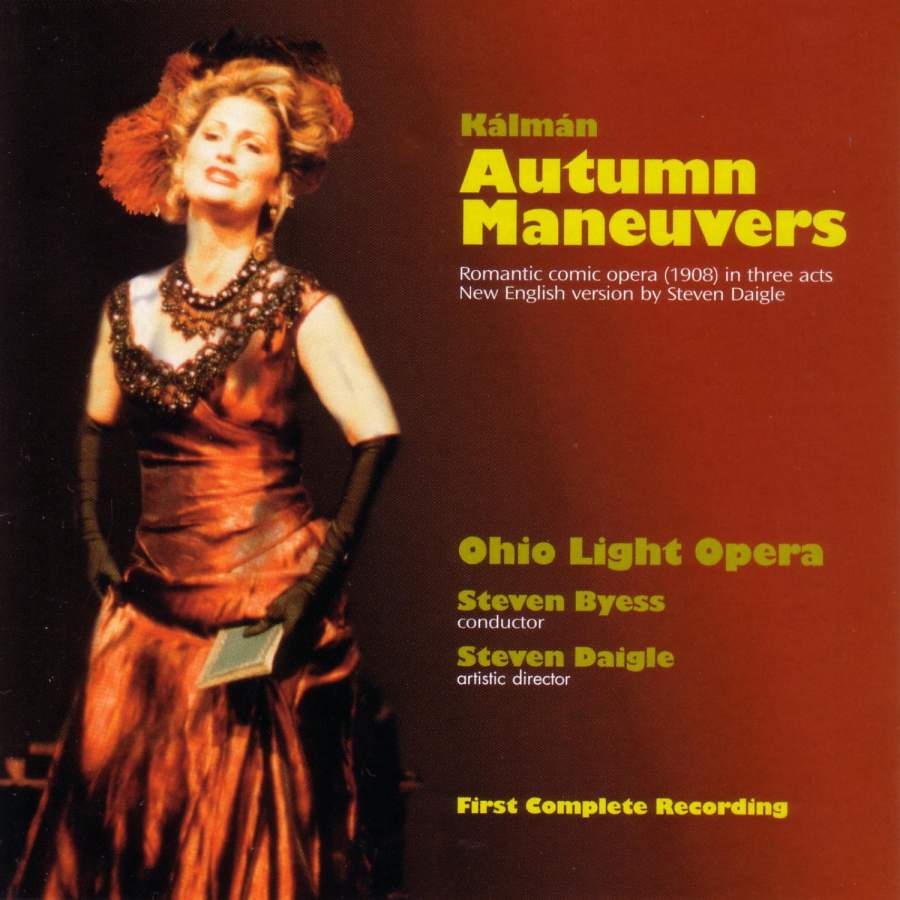
The 2003 version of “Autum Maneuvers” from Ohio Light Opera. (Albany Records)
I’d also be curious to hear the original 1909 Vienna version with singing actors, a cabaret Wallerstein, a cross-dressed Marosi and maybe a slightly reduced orchestral approach.
But on the other hand, some of the big bang orchestra moments are thrilling to hear, and Hofstetter does get the pianissimo passages very right. And he makes them sound absolutely lovely. Even if the tension somehow wears off, somewhere along the way.
That said, you should still go and grab a copy now, even if you already have the Albany double (!) disc. The only serious competition is the live radio broadcast which is more complete. But on CD the sound is slightly better balanced, and the booklet is beautifully produced, with all essays in German and English, also there are lots of beautiful photos (without captions)!

As a devoted fan of Kalman’s music, I have thoroughly enjoyed your review. How can I subscribe to your center? Again, thank you!
Dear Luis de la Vega, you can simply check in on the site regularly, or follow us on Facebook with (almost) daily posts. Though not all of them concern Kalman. Thank you for your kind words about ORCA!